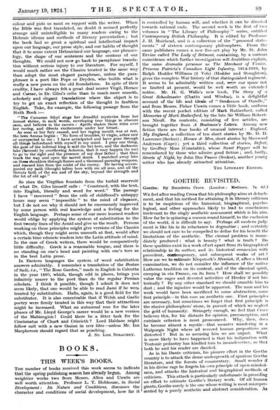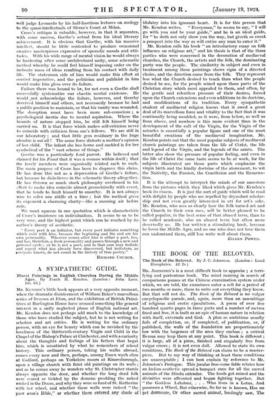GOETHE RE VISITED.
WE feel after reading Croce that his philosophy aims at detach- ment, and that his method for attaining it in literary criticism is to be suspicious of the historical, biographical, psycho- logical, and other approaches likely to lead to conclusions irrelevant to the singly aesthetic assessment which is his aim. How far he is spinning a cocoon round himself, to the exclusion of the world, it is difficult to say. Perhaps all modern judg- ment is like his in its reluctance to dogmatize ; and certainly we should not care to be compelled to define for his benefit the limitations of the aesthetic. The eternal problem is imme- diately produced : what is beauty ? what is truth ? Do these qualities exist in a work of art apart from its biographical relationship to its author, and its historical connexion with precedent, contemporary, and subsequent works of art ? How are we to estimate Klopstock's Messiah, if, after a literal examination, we do not consider the influence of the native Lutheran tradition on its content, and of the classical spirit, creeping in via France, on its form ? How shall we possibly value the eager and devoted activities of Herder if not his- torically ? By any other standard we should crumble him to dust ; and the injustice would be apparent. The man and his work would have been sacrificed to some abstraction, sonic first principle—in this case an aesthetic one. First principles are necessary, but sometimes we forget that first principle is the elusive philosophers' stone, in pursuit of which we neglect the gold of humanity. Strangely enough, we feel that Croce believes this, for his distaste for opinion, preconception, and extrinsic criterion is most pronounced. Why, then, does he become almost a mystic—that monster wandering in a Walpurgis Night where all revered human proportions arc distorted ? But in so accusing him we are unjust. What is more likely to have happened is that his indignation with Teutonic pedantry has kindled him to incandescence, so that both he and his reader are dazzled.
As in his Dante criticism, his pioneer effort in the Goethe country is to attack the dense undergrowth of spurious Goethe literature, and the forests of' commentary. Small wonder if
in his divine rage he forgets his own principle of open-minded- ness, and attacks the historical and biographical methods of criticism. This attack is particularly unfortunate in preceding an effort to estimate Goethe's literary work. Of all human giants, Goethe surely is the one whose writing is most misrepre- sented by a purely aesthetic and abstract consideration. As
well judge Leonardo by his half-facetious lectures on zoology to the quasi-intellectuals of Sforza's Court at Milan.
Croce's critique is valuable, however, in that it separates, with some success, Goethe's actual from his ideal literary achievement. It is obvious that Goethe, with his massive intellect, should be little contented to produce occasional creative masterpieces expressive of sporadic moods and atti- tudes. With his wide range of mental vision he would always be hankering after some architectural unity, some schematic method whereby he could feel himself imposing order on the inchoate mass of ideas resulting from his contact with daily life. The statesman side of him would make this effort at control imperative, and the politician and publicist in him would make him gloss over its failure.
Failure there was bound to be, for not even a Goethe shall successfully systematize our chaotic mortal existence. He would not acknowledge the failure, however, and thereby deceived himself and others, not necessarily because he had a public position to maintain, or that his vanity was wounded.
The deception must have been more sub-conscious ; a psychological inertia due to mental aspiration. Where the bounds of nature stopped him, he still felt himself being carried on. It is that force which makes self-criticism never
to coincide with criticism from one's fellows. We are still in
our laboratory ; and that little gem residuary in the huge alembic is not all ! The same force distorts a mother's opinion of her child. The infant she has borne and suckled is for her symbolical of the " vast scheme of things."
Goethe was a particularly fond parent. He believed and claimed for his Faust that it was a cosmos within itself ; that the lovely members were organically related each to each.
The main purpose of Croce has been to disprove this claim. He has done this not as a deprecation of Goethe's failure, but because he disbelieves in the schematic theory altogether. He has thrown so much stock philosophy overboard in his effort to make idea coincide almost geometrically with event, that lie tends to limit himself to anarchy. It is not. always wise to solve one riddle at a time ; but the method gives its exponent a charming clarity—like a morning air before rain.
We must squeeze in one quotation which is characteristic of Croce's insistence on individualism. It seems to us to be very wise, and the highest point which can be reached by its author's theory of aesthetic.
" Every poet is an initiator, but every poet initiates something which ends with him, because the beginning and the end are his own personality. Whoever comes after him is either a poet, too, and has, therefore, a fresh personality and passes through a new and personal cycle ; or he is not a poet, and m that case may imitate and repeat what has already been discovered, but imitators, as everyone knows, do not count in the history of true poetry."
RICHARD Cnuacs.











































 Previous page
Previous page